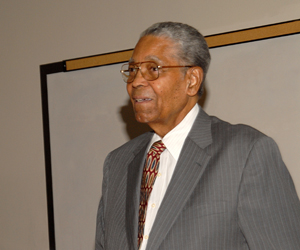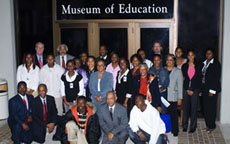| |

Home
|
|
|
|
Pedagogical Activism and Social Justice
|
|
|
This research project falls within the realm of the “long civil rights movement”—an effort to examine the struggle for civil rights and social justice during the decades before the 1954 Brown v. Board of Education Supreme Court decision. One of the more complex questions that arises in the field of education concerns teachers’ efforts to engage in political and cultural struggle. Black teachers during the 1940s who were members of the NAACP ran the risk of losing their jobs; public statements and actions could have been life-threatening. Even support of unions could cause a teacher to be dismissed, as was the case at Huntington High School and, somewhat indirectly, here at Booker T. Washington High School.
Years of hindsight offer little insight for today’s research to ascertain what acts and gestures should have been undertaken by teachers in 1940. Social activism within the classroom and outside of the school take on differing meaning and levels of “impact.” What does become apparent is that Booker T. Washington High School educators were well aware of social injustices, and seemingly many engaged in efforts to instill courage among students as a way to work for civil rights and social justice.

“Principal Simmons advocated proper conduct at all times. He wanted Booker Washington students to stand out in the manner in which we exhibited ourselves. If we stepped onto a bus or if we were walking down the street and if persons of another race saw us, they should immediately recognize that we were Booker Washington students. And, of course, we were expected to be proud and to be dignified to the extent that students of that age could exhibit dignity.”
Matthew J. Perry, Jr., a student at Booker T. Washington High School
|
|
|
|
|
Columbia’s struggle for civil rights,
“a quiet story of constant and consistent struggle,”
was waged not in the streets but in the courts. Stemming from research for his masters thesis at Teachers College, J. A. Simmons would confront the educational establishment of Columbia by initiating a lawsuit for the equalization of salaries for black teachers. Albert N. Thompson, Sr., a 1936 graduate of Booker T. Washington High School who would later become a teacher at the school, successfully brought a lawsuit against the Richland County Schools in 1944 (Thompson vs. Gibbes, et al.) to equalize the salaries of African-American and white teachers. Simmons, partly due to the commotion caused by the lawsuit and partly due to his receiving a Rosenwald Fellowship, would leave Columbia, and Thompson would lose his teaching position and subsequently move to Texas where he served as professor at Texas Southern University.
While contemporary accounts may criticize the respectability politics and accommodationist stance of educators from this era, these teachers, from students’ accounts, conveyed a sincere concern for the well-being and welfare of their students and recognized the crucial role of teachers as agents for cultural and racial change (and they did indeed engage in acts of micro-defiance, as portrayed within the schools’ web exhibitions).
|
|
|
|
|
|
|
|
|
|
|
|
|
|
|
|

return to
Booker T. Washington, High School, SC
|
|
|
|
|
|
|
|
|
|
|
|





